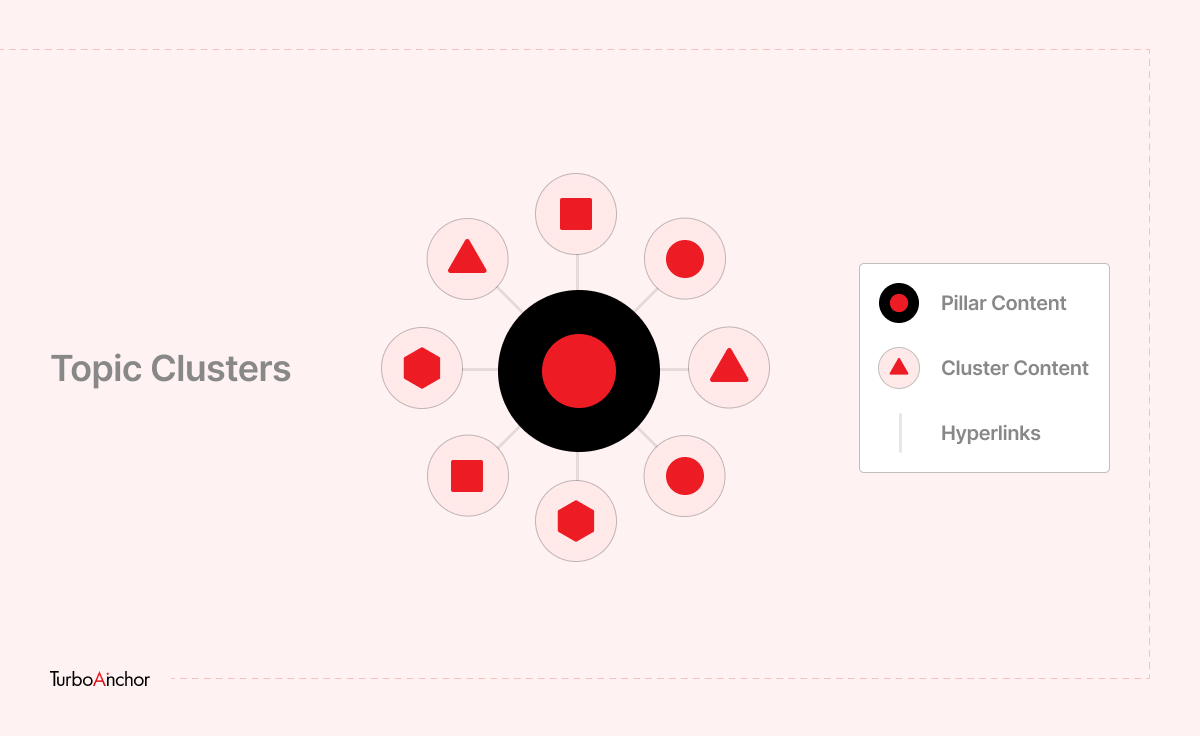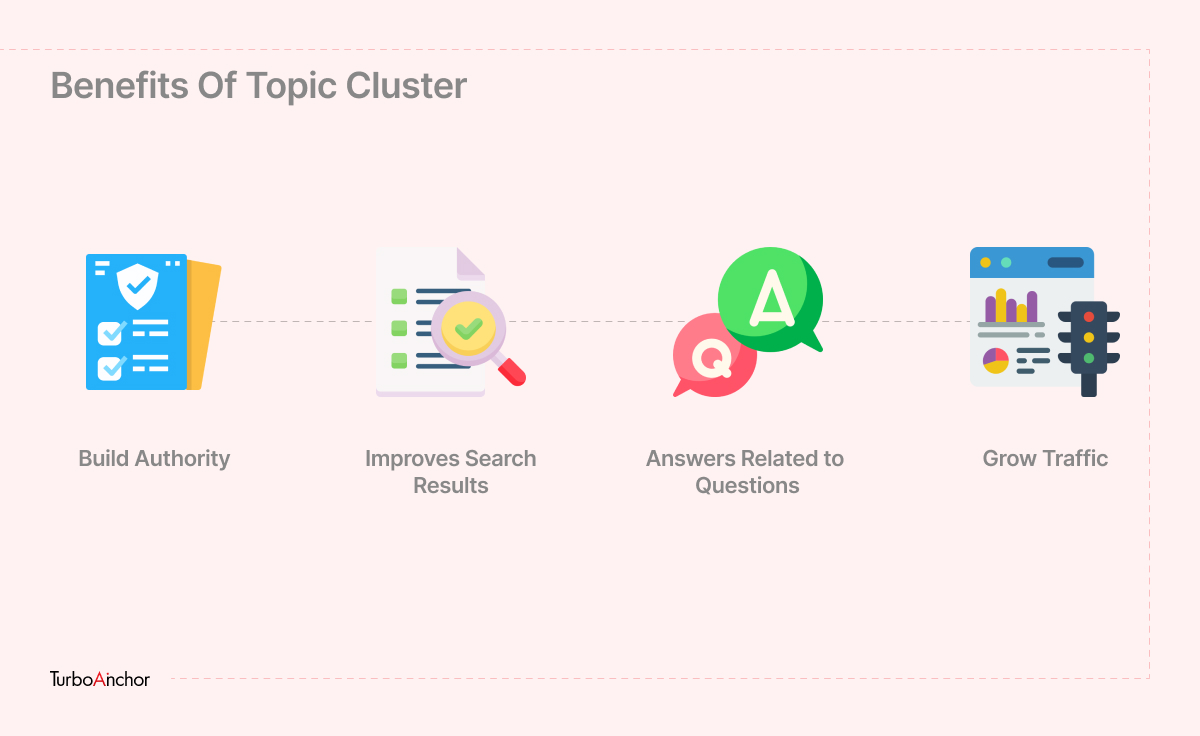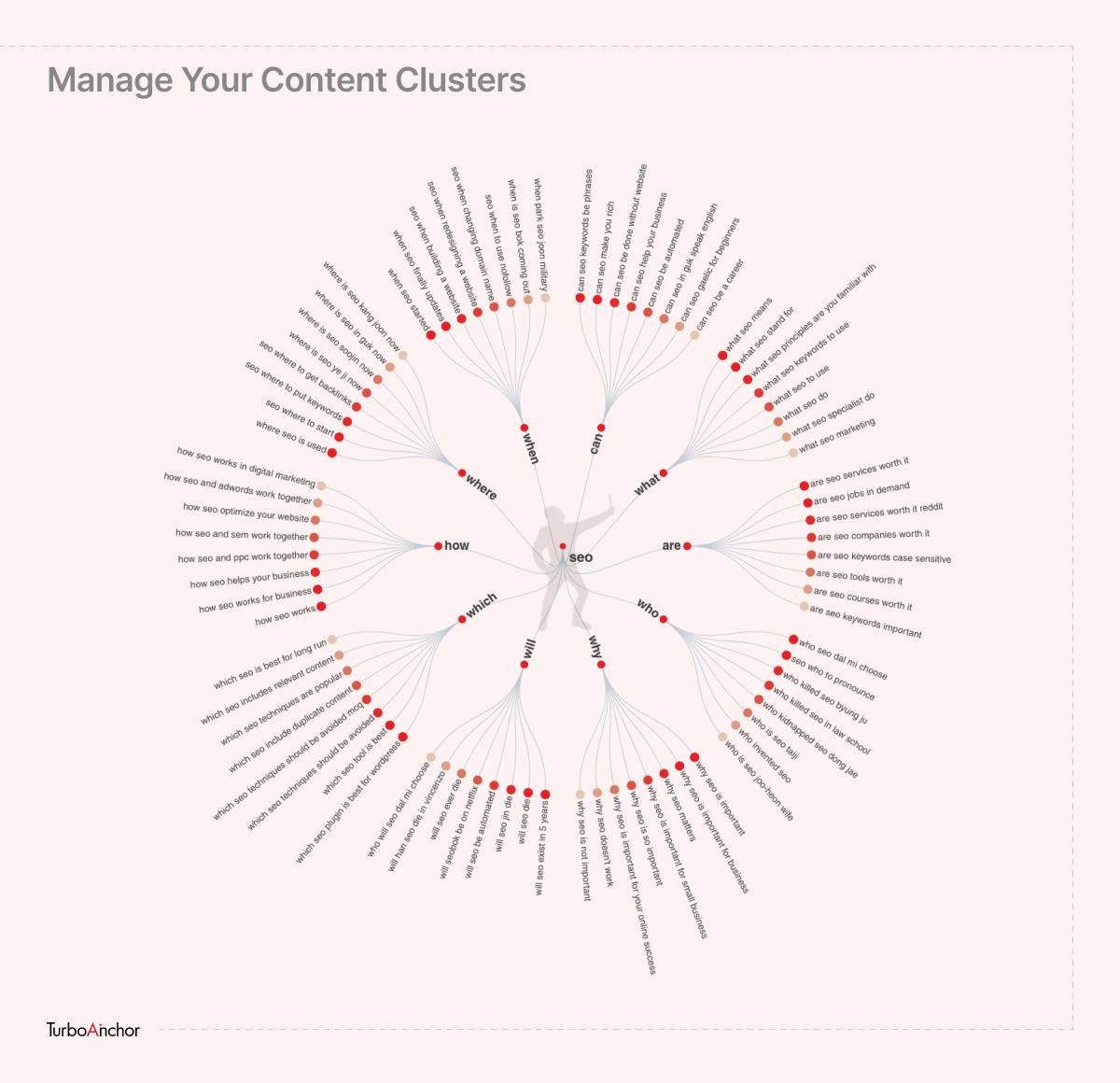A topic cluster is a collection of related content covering a broad subject area. As a whole, these pages offer comprehensive information about a particular topic that is linked to and from a main page.
Topic clusters are built around pillar content (or pillar pages). The content of pillar pages focuses on broader subject areas, and they tend to target general industry keywords with a greater search volume.
Unlike the pillar content that addresses a broad topic, the cluster content focuses on a specific keyword related to your long-tail keyword discussing it more thoroughly and comprehensively.
They also establish a robust internal linking structure. The links from pillars that are authoritative to cluster content transmit authority to the rest of the cluster and vice versa.
Every link should also have an anchor text that describes the link properly. Providing this description helps search engines better understand what each link is about. When visitors reach your site, they can find answers to their search inquiries.

Why Go For A Content Cluster Strategy?
The question is, why consider topic clustering a perfect long-running strategy to get rankings for broad, overreaching keywords?
In general, most new websites have a low domain authority, which means that even high-quality content cannot rank for more competitive keyword phrases.
By leveraging topic clusters, you will be able to rank for less competitive keywords and begin driving traffic immediately. By building up your site authority, you will be able to rank for more relevant keywords.
The Following Are SEO Goals Of Topic Clusters:
- You can gain search traffic for long-tail, lower-volume keywords using cluster content.
- With the help of competitive keywords, get your pillar content performance level to a newer level.
- Develop your site’s credibility on specific topics so Google sees you as an expert in your field.
Why Topic Clusters Matter To SEO?
In two ways, topic clusters can significantly impact SEO results if properly managed. Firstly sites that cover their respective topic in-depth help in increasing their overall page ranking
and site authority.
As we know, Google’s purpose is to deliver relevant results that match searched intention—using topic clusters to comprehensively cover subject tips the likelihood of reaching high indexing in your support. In the shorter term, internal linking helps distribute PageRank, therefore enhancing the SERP performance of pages that otherwise do not do that good.
In simple words, the sites with a large topic cluster and are well-organized are likely to get a higher listing in results. Therefore, going for measures like On page- SEO is better for you and your audience if you plan to grow your site. You need to keep in mind that the greater the number of the content results in more coverage of the topic.
Read More: What is On Site, Off Site & Technical SEO?
For example, Let’s suppose you search for a beauty soap and you might be considering that Dove or Lux would show up in the top of search results but it didn’t. The reason might be that there wasn’t that much organic content like other brands might have different blog posts etc.
Benefits of Topic Cluster?

Build Authority
Creating various quality content related to a one-pillar topic makes search engines consider you a reliable and authoritative site on that topic. To achieve topical authority you should keep focusing on a single topic or particular keyword and build from there rather than going for multiple random topics.
For example, suppose you have navigational pages for Books, bags, and shoes. In that case, you want to create content around those navigations and their subcategories.
Keeping in mind is to link content back to the pillar page. Search engines utilize links as a signal of authority. SERP ranks depend on the number of links back to the pillar page, so the more the links, the higher the rank.You can use topic research tools that can help you find the right topic and create engaging content for your audience.
Improves Search Results
Now improve search results by just creating content clusters of a specific topic. In today’s time, users want instant and more results with just a minimum effort; therefore, the topic cluster is so compulsory. You can search for general topics rather than write down specific keywords. Search engines get you a variety of relevant content related to the topic.
Answers Related to Questions
Users can get answers to related questions they have, particularly to the same topic. Let’s suppose you are looking to get fair skin; the search engine will display related topics without typing specific keywords. Sometimes the related topics answer your questions that didn’t even cross your mind.
TIP: Featured snippets
Grow Traffic
To grow the relevant top-of-the-funnel traffic and generate leads topic clusters is the way to go. Organically, you can get traffic toward your brand and site just by complete and valuable content. Topic clusters let people explore specific topics and topics related to them.
How To Create Topic Clusters?
Following are the ways you can create Topic cluster,
Choose the Right Topics
Pillar pages play a massive role in your SEO and content marketing strategy. Brainstorm and pick a relevant topic cluster on which to create your pillar page.Try going on topics relevant to your brand, product, or service. That is related to your target audience and interest. Provide solutions to customer questions and should have complete intel related to the topic that establishes your expertise.
Come Up with Subtopics
Coming up with relevant subtopics that support your main topic can prove to be very vital for building your authority. Following are some ways you can accomplish it:
- Try going for long-tail keywords as they give you more clear ideas of users’ interests.
- Your buyer’s persona works as an insight in providing what the target audience wants to know.
- Customer reviews, surveys, and customer feedback can prove very beneficial as it lets you know about any loopholes in your service or products.
- Use social listening tools as they let you know about the likes and dislikes of people. It also lets you know about people’s queries.
Manage Your Content Clusters
Start by making an inventory of blog posts, web pages, e-books, white paper and your existing content. Secondly, create a content cluster by making a set of topics or themes. Thirdly, if there are any topics that you haven’t written anything about, then first secure the loophole by creating a new blog post. Lastly, if there is anything similar or unnecessary that might puzzle the reader, remove or merge it.

Write Your Pillar Pages
When creating your pillar pages, make sure you follow these suggestions:
- Create high-quality, in-depth content related to the topic that should be well researched and delivered.
- Go for compelling and eye-catchy images that grab readers’ attention and make them engage.
- Make a sequenced structure of pillar pages, starting with a table of contents and subheadings to guide the readers to the end.
- Add some additional content like e-books, research papers or online tools in sort of complimentary surveying.
Add Internal Linking
In the end, when you are done publishing your pillar pages and content cluster, the last that is left is to link them. It will signal to Google that you have content related to the searched topic. Make sure your content cluster and pillar pages link to supporting pages and subtopics, blogs, or posts with each other.
How to Measure Topic Cluster Results
Creating quality content isn’t enough; now, you have to measure topic cluster results. You can improve your quality of content and rank. Remember that metrics tools typically focus on page performance rather than content cluster when looking at such data. To measure your topic cluster’s performance, you can use tools like Google Analytics or a specially designed Content Strategy Tool like Semrush. You can automatically create more content and grow those clusters after you uncover which cluster had the most success and where they’re being considered. It will not help you save time thinking about developing more content; you will have ample time to know what works better for your organization.
Final Thoughts
So if you are working either as a freelance or as a digital marketer and go around and generate content or blogs, then going for the topic cluster is your thing. They serve as a signal to search engines and provide the reader with the content or blog related to the topic they searched about or want the information to know. After fully understanding the topic cluster model, you can organize your content marketing strategy and become more organized, precise, and on point.
Suggested Read:
- How are Web Pages Ranked: Important Ranking Factors
- What are Keywords & How to Do Effective Keyword Research?